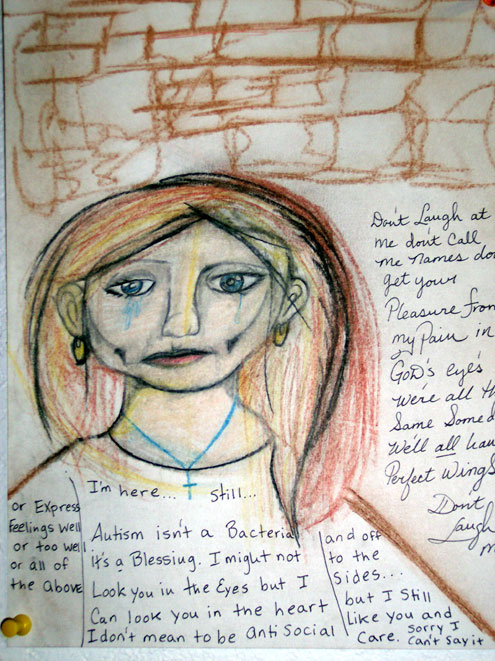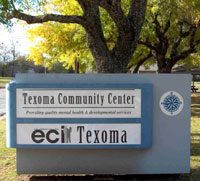“I do not seem to be able to verbally communicate with people so I try to communicate with my art," says Ruth (not her real name). "My verbal communication is misunderstood many times. I was diagnosed with autism--Asperger’s Syndrome in 2008. Now I understand why I was always in trouble at school. Noise always bothered me and made it hard for me to function. I liked to sit in a corner and seclude myself. No one knew what to do with me.”
“In school from second grade to 12th grade, I was in Social Adjustment Classes (SAC), life skills, Special Education, Learning Disabilities, and very minimal mainstream classes, and detention. I even had a speech impediment in my early years. But later on it was my smart, sarcastic mouth that kept me in trouble. It took me seven years to finish high school and much of that time was spent in detention. At one time I was diagnosed with Attention Deficit-Hyperactivity Disorder (ADHD) and bipolar disorder. Much of my life I had thought I had a mental illness. One psychiatrist told me to be tested for autism. He did not believe I had a mental illness. When autism was the diagnosis, it made sense to me. I finally got it.”
Ruth admits to beginning her art career by drawing on her mother’s walls at the age of two. Throughout her school years, Ruth was selected to enter art in University Scholastic League (UIL) and city contests. Her earliest prize was won when she was seven years old. Her art work was used on the school calendar. Every contest she entered won her a best of show, honorable mention, or a blue ribbon. Everyone thought she had talent. Her most recent win was a National Autism and Arts Contest in 2012 through the University of North Texas.

She loves to do art and it makes her feel good. She works in acrylics, watercolors, charcoal, pencil, and markers. Ruth has a higher than average IQ, loves to read, writes poetry and even books. She can express her feelings through art, poetry, and writing that she is unable to do through the spoken word or non-verbal communication. Several of her drawings discuss the topic of autism.
Ruth found help and support in another county through the Autism Society. She has been in the Texoma area for three years and has recently begun attending a day habilitation program operated by Texoma Community Center. She also receives case management. She wants to learn to drive and her case manager thought the socialization at the day program would be good for her. She lives independently and uses community support services to help meet her daily living needs.
Individuals with Asperger’s Syndrome have certain symptoms which could include one or any number of the following: lack of social awareness; lack of in interest in making and sustaining friendships; inability to convey thoughts, feelings or emotions to others; avoidance of eye contact; lack of facial expression; lack of use or comprehension of gestures; inability to perceive nonverbal cues or communications; failure to respect interpersonal boundaries; and may be sensitive to noises, touch, odors, tastes, or visual stimuli; inflexibility; dependence on routines; and repetitive speech or motor patterns.
Seventy-five to eighty percent of these individuals have intellectual disabilities. Asperger’s is usually not suspected until around the age of five through eleven. There is no cure for Asperger’s, but good results are experienced with individual psychotherapy, parent education and training, social skills training, and education intervention. “In my opinion, education intervention only works if the interventionists get educated,” ends Ruth.
